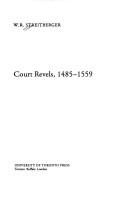| Listing 1 - 4 of 4 |
Sort by
|

ISBN: 1282003038 9786612003035 1442673559 080200590X 1442614862 9781442673557 9781282003033 9780802005908 Year: 1994 Volume: 3 Publisher: Toronto Buffalo University of Toronto Press
Abstract | Keywords | Export | Availability | Bookmark
 Loading...
Loading...Choose an application
- Reference Manager
- EndNote
- RefWorks (Direct export to RefWorks)
In 1545 Henry VIII created a Revels Office within the royal household and appointed Sir Thomas Cawarden, one of the gentlemen of the Privy Chamber, as its Master. In so doing he set a precedent for the production of revels at court for the next century. Some historians have only recently examined the revels in their historical context, but none has attempter, as W.R. Streitberger does, to study court entertainments in terms of the growth and development of the Revels organization and its adaptation to different political climates at court. Streitberger presents evidence in the form of a calendar of court entertainments and appendices based on the primary documents; he provides an explanation of their occasion, form, and purpose of these entertainments in their historical context; and he explains the development of the revels organization from the temporary appointment of producers at the beginning of their period into a government office by the mid-sixteenth century. Streitberger details the adaptation of the Revels organization to the very different courts of the various monarchs, and explains how their personalities, principles, and policies shaped that adaptation.
Pageants --- Amusements --- Performing arts --- History --- Production and direction --- Chronology. --- Great Britain --- Court and courtiers --- Production and direction. --- English literature --- Direction (Performing arts) --- Production (Performing arts) --- Direction --- Amateur plays --- Festivals --- Processions --- Show business --- Arts --- Performance art --- Children --- Entertainments --- Pastimes --- Recreations --- Entertaining --- Games --- Play --- Recreation --- English drama --- Early modern and Elizabethan, 1500-1600 --- History and criticism --- Masks --- Theater --- England --- 16th century --- Theater and state --- 19th century --- English drama - Early modern and Elizabethan, 1500-1600 - History and criticism. --- Masques - History and criticism. --- Theater and state - England - History - 16th century. --- Great Britain - Court and courtiers. --- Great Britain - History - Henry VIII, 1509-1547. --- Henry --- Relations with courts and courtiers. --- Great Britain. --- Henricus --- Heinrich --- Enrique --- Henri --- Hendrik --- Enrico --- England and Wales.
Digital
ISBN: 9781442673557 Year: 2016 Publisher: Toronto, Ont. University of Toronto Press
Abstract | Keywords | Export | Availability | Bookmark
 Loading...
Loading...Choose an application
- Reference Manager
- EndNote
- RefWorks (Direct export to RefWorks)
Book
Year: 1986 Publisher: Oxford : Oxford University Press,
Abstract | Keywords | Export | Availability | Bookmark
 Loading...
Loading...Choose an application
- Reference Manager
- EndNote
- RefWorks (Direct export to RefWorks)
Grande-bretagne --- Histoire --- Histoire economique --- 17e siecle --- 1603-1649 (premiers stuarts) --- Sources
Book
ISBN: 9780198719670 Year: 2016 Publisher: Oxford Oxford University Press
Abstract | Keywords | Export | Availability | Bookmark
 Loading...
Loading...Choose an application
- Reference Manager
- EndNote
- RefWorks (Direct export to RefWorks)
The Masters of the Revels and Elizabeth I's Court Theatre places the Revels Office and Elizabeth I's court theatre in a pre-modern, patronage and gift-exchange driven-world of centralized power in which hospitality, liberality, and conspicuous display were fundamental aspects of social life. W.R. Streitberger reconsiders the relationship between the biographies of the Masters and the conduct of their duties, rethinking the organization and development of the Office, re-examining its productions, and exploring its impact on the development of the commercial theatre. The nascent capitalist economy that developed alongside and interpenetrated the gift-driven system that was in place during Elizabeth's reign became the vehicle through which the Revels Office along with the commercial theatre was transformed. Beginning in the early 1570s and stretching over a period of twenty years, this change was brought about by a small group of influential Privy Councillors. When this project began in the early 1570s the Queen's revels were principally in-house productions, devised by the Master of the Revels and funded by the Crown. When the project was completed in the late 1590s, the Revels Office had been made responsible for plays only and put on a budget so small that it was incapable of producing them. That job was left to the companies performing at court. Between 1594 and 1600, the revels consisted almost entirely of plays brought in by professional companies in the commercial theatres in London. These companies were patronized by the queen's relatives and friends and their theatres were protected by the Privy Council. Between 1594 and 1600, for example, all the plays in the revels were supplied by the Admiral's and Chamberlain's Players which included writers such as Shakespeare, and legendary actors such as Edward Alleyn, Richard Burbage, and Will Kempe. The Queen's revels essentially became a commercial enterprise, paid for by the ordinary Londoners who came to see these companies perform in selected London theatres which were protected by the Council.
Directing --- Drama --- anno 1500-1599 --- United Kingdom
| Listing 1 - 4 of 4 |
Sort by
|

 Search
Search Feedback
Feedback About UniCat
About UniCat  Help
Help News
News